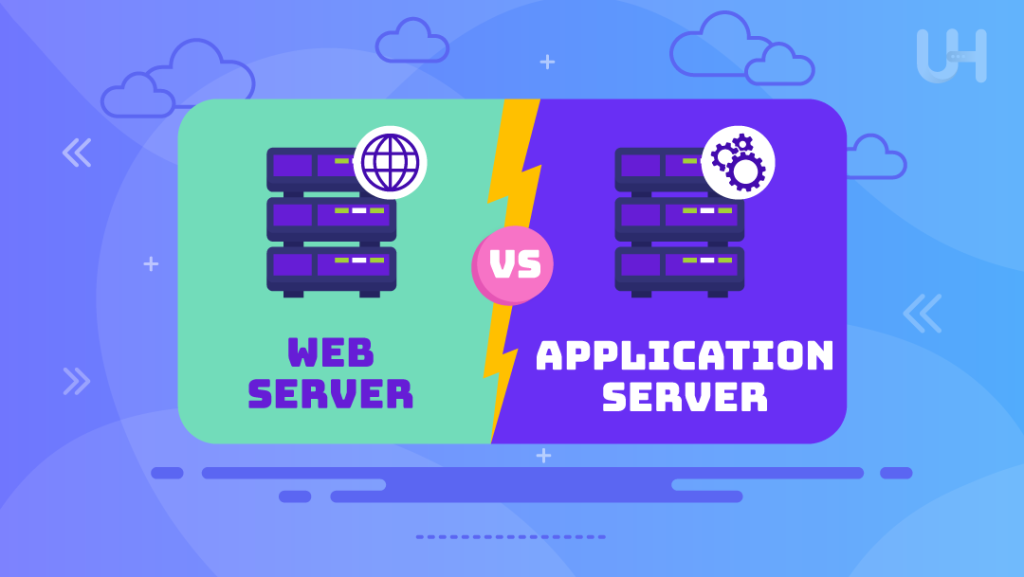
In today’s fast-paced digital world, selecting the right server infrastructure is one of the most critical decisions businesses must make when building and deploying web applications. The performance, scalability, and overall success of your application can hinge on whether you choose a web server or an application server. While both types of servers play a vital role in delivering web content, they serve different functions and are designed to handle specific tasks.
In this blog, we will explore the fundamental differences between web servers vs application servers, examining their roles, key functionalities, and specific use cases. By the end, you’ll have a clearer understanding of which server is best for your business based on your application’s demands, whether you’re focused on high performance, scalability, or ease of management. We’ll also provide actionable insights to help you make the best choice, ensuring that your web applications are optimized for success.
1. Overview of Web Server vs Application Server
Understanding the differences between a web server vs application server is essential for making the right choice when developing and deploying web applications. While both servers are crucial for serving content to users, they perform distinct functions and are optimized for different types of workloads. Below, we’ll break down the purpose, functions, and examples of each.
1.1 What is a Web Server?
A web server is a specialized piece of software that primarily handles HTTP requests. Its main role is to serve static content—such as HTML pages, CSS stylesheets, JavaScript files, images, and other media files—to users who visit a website. It listens for incoming HTTP requests from browsers or other clients and responds by delivering the requested static resources.
Web servers are designed to be highly efficient and lightweight, optimized for serving a large volume of requests simultaneously. However, they don’t process complex business logic or interact with databases. Instead, they focus on delivering content as quickly as possible, making them ideal for websites that don’t require dynamic content generation.

Key features of web servers include:
- Handling Static Files: Web servers excel at delivering static files like HTML, CSS, JavaScript, and images to the user’s browser.
- Efficient Request Handling: Web servers can handle thousands or even millions of simultaneous requests by efficiently managing network connections.
- Load Balancing: They often include load-balancing capabilities to distribute traffic across multiple servers, ensuring reliability and speed.
Because web servers don’t process dynamic content, they are often used in conjunction with other systems (such as application servers or scripting languages like PHP) to handle more complex tasks.
Examples of Web Servers:
- Apache HTTP Server: One of the most widely used open-source web servers, known for its flexibility and robust community support.
- Nginx: A high-performance web server that is particularly good at handling a large number of simultaneous connections, often used for high-traffic websites.
- Microsoft IIS (Internet Information Services): A web server created by Microsoft, used predominantly in Windows environments.
1.2 What is an Application Server?
An application server takes things a step further by not only delivering web content but also processing dynamic content and managing business logic. Unlike a web server that primarily serves static files, an application server can generate dynamic responses based on user interactions, handle database connections, and execute server-side logic.
An application server is essentially a comprehensive platform that hosts and executes web applications. It handles the core business logic, processes requests, and interacts with various backend services, such as databases, messaging systems, or APIs. This allows application servers to support dynamic websites, where content and user interactions change depending on inputs (like user authentication, product orders, or database updates).

Key features of application servers include:
- Handling Dynamic Content: Application servers can generate dynamic web pages, such as personalized user dashboards, shopping carts, or product recommendations based on real-time data.
- Business Logic Processing: These servers execute complex business rules and application workflows, making them ideal for enterprise applications.
- Integration with Databases: Application servers often come with built-in connectors or APIs that allow seamless integration with databases, enabling them to handle data-driven applications like e-commerce sites or content management systems (CMS).
- Middleware Capabilities: Application servers typically include features such as security management, transaction handling, messaging services, and load balancing to manage complex, multi-tiered web applications.
Examples of Application Servers:
- Apache Tomcat: A lightweight application server often used for running Java-based web applications.
- JBoss (WildFly): An open-source application server developed by Red Hat, offering robust support for Java EE (Enterprise Edition) applications.
- Oracle WebLogic: A full-featured application server that supports enterprise-level applications, offering powerful integration with Oracle’s database and middleware services.
2. How to Choosing the Right Server Based on Business Needs
When choosing between a web server vs application server, it’s crucial to evaluate your business’s unique requirements. Factors such as performance, application scale, and scalability significantly influence which server best suits your project. Below, we’ll explore how each type of server performs in different scenarios and which one aligns with your business goals.

2.1 Performance Considerations
- Web Server: If your application primarily serves static content such as HTML pages, CSS files, JavaScript, or images, a web server is an optimal choice. Web servers are lightweight and fine-tuned for efficiently handling high volumes of simple HTTP requests. For websites like blogs, news portals, or basic company landing pages that do not involve complex data processing or user-specific content, a web server can deliver outstanding performance. The absence of business logic processing reduces overhead, allowing faster response times.
- Application Server: On the other hand, if your application requires processing complex business logic, frequent database interaction, or personalized dynamic content, an application server is the right choice. Applications such as e-commerce platforms, customer relationship management systems (CRM), or any system that needs to process user inputs, calculate real-time data, or manage multiple layers of logic will benefit from the advanced capabilities of an application server. While slightly more resource-intensive, application servers ensure that your system can perform real-time computations, integrate with databases, and respond to user actions dynamically.
2.2 Application Scale
- Web Server: For small businesses or projects with limited scale, where the application doesn’t require heavy processing or constant interaction with databases, a web server is more than sufficient. Simple websites, small company portfolios, or blogs that focus primarily on delivering content to users can thrive on a web server’s minimalist architecture. Similarly, for small online stores with limited inventory or customer traffic, a web server can effectively manage the workload while keeping costs low.
- Application Server: In contrast, large enterprises or organizations with complex and mission-critical applications will find an application server indispensable. Enterprises dealing with systems like enterprise resource planning (ERP), business management systems, banking systems, or high-traffic e-commerce platforms need the processing power and stability that an application server provides. These systems often involve multiple layers of logic, numerous user requests, and constant interaction with databases or third-party services, requiring robust infrastructure to ensure smooth performance and reliability.
2.3 Scalability
- Web Server: If your business operates on a smaller scale and does not anticipate significant growth in the near term, a web server provides a cost-effective and manageable solution. It can handle a moderate number of HTTP requests without requiring complex configurations or resource-heavy setups. As web servers are designed to deliver static content with ease, they are well-suited for businesses that don’t need to handle dynamic or unpredictable workloads.
- Application Server: For businesses that expect rapid growth or need to support applications with complex, multi-tiered architectures (such as UI, business logic, and database layers), an application server is a far more scalable solution. Application servers are designed to handle increasing traffic loads and can easily scale horizontally or vertically as your user base grows. They offer advanced features, such as load balancing, clustering, and high availability, making them suitable for large-scale applications that require continuous uptime and scalability without performance bottlenecks.
3. Benefits of Using Web Server vs Application Server
3.1 Benefits of Using Web Servers
- High Performance for Static Content: Web servers are optimized to handle simple HTTP requests efficiently, making them extremely fast at serving static files. This leads to reduced response times and better performance for websites that don’t need to generate dynamic content.
- Simple Management: With their simpler architecture and configuration, web servers are easier to deploy, manage, and maintain. They require fewer resources, making them ideal for small teams or businesses with limited technical expertise.
- Cost-Effective Solution: Web servers generally have lower resource requirements and operational costs, making them a budget-friendly option for small businesses or projects without high demands for dynamic content or complex backend processing.
3.2 Benefits of Using Application Servers
- Processing Complex Business Logic: Application servers excel in managing complex, dynamic web applications by processing business logic on the server side. This makes them ideal for interactive applications, such as e-commerce platforms or customer portals, that require user-specific content, data validation, or transaction management.
- Enhanced Scalability: Application servers are built to scale effortlessly, ensuring your system can accommodate growth in both traffic and complexity. They can handle concurrent user requests, manage resource-intensive operations, and provide seamless performance as your application expands.
- Integration with Backend Services: Application servers support easy integration with various backend systems, including databases, APIs, and cloud services. This allows for more flexible and feature-rich applications, as the server can act as a hub for managing multiple services and technologies within your infrastructure.
4. When to Use Web Server vs Application Server

4.1 Use a Web Server When:
- Your application primarily serves static content, and there is little to no need for complex data processing or business logic.
- The application is a simple website, blog, or small online store that doesn’t involve personalized user interactions or real-time data processing.
- You have a limited budget and don’t expect significant growth in traffic or complexity in the near future.
4.2 Use an Application Server When:
- Your application involves complex business logic, processes dynamic content, and frequently interacts with databases or external services.
- You anticipate scaling your business or application to handle more users, complex workflows, or additional services as the business grows.
- You are developing a multi-tiered system or need your server to handle integration with various external tools, such as databases, APIs, or messaging services.
5. Conclusion
In summary, the choice between a web server vs application server depends on your business needs, application complexity, and scalability requirements. Web servers are ideal for static, simple websites, while application servers handle dynamic, complex systems. Selecting the right solution ensures your application runs efficiently and can scale as your business grows.
For expert guidance in choosing and implementing the best server solution, ONEXT STUDIO offers comprehensive development services tailored to your specific needs. Let us help you build a robust, scalable system that aligns with your business goals.





